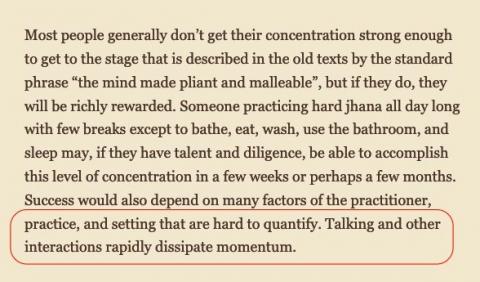In the book I’ve been reading lately, meditation master Daniel Ingram makes it clear here (and other places) that interacting with others makes practicing at deep levels basically impossible. I always thought that’s why retreats are silent, and it’s nice to confirm that.
Scala, Java, Unix, MacOS tutorials (page 15)
| Tiny Changes, Remarkable Results | |
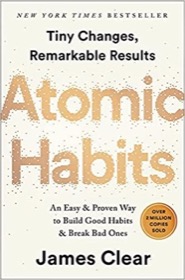
|
Atomic Habits |
“Books are the training weights of the mind.”
~ Epictetus
January 15, 2024: I just released 15 new videos for my free “Introduction to Functional Programming” video course. The new videos start with this Try, Success, Failure video, and get into developing the second application
If you’re ever at the SBT command line and want to limit the number of compiler errors shown by the compile task, this command sets the maximum number of errors outputted to 5:
Cats sit on the window sill
Children sit in the show
Why do I feel I don't fit in
Anywhere I go
Thunder clouds have their lightning
Nightingales have their song
And don't you see I want my life
To be something more than long
Rivers belong where they can ramble
Eagles belong where they can fly
I've got to be where my spirit can run free
Gotta find my corner of the sky
~ from “Corner Of The Sky,” written by Stephen Schwartz (sung by the Jackson 5, Dusty Springfield & Petula Clark, and others)
You go through a lot of strange things when you meditate deeply. One time I was talking with a friend and then I just started bawling my eyes out, and I was finally able to blurt out, “I don’t even know why I’m crying.”
“Perfected beings are pure awareness.”
~ Ram Dass, as I write about here
In a Buddha there has never been
Anything that could be said to be there.
Just as a magician
Does not get caught up in his illusions
And therefore by his knowledge
Is not attached to magic forms,
So also the wise in Perfect Enlightenment
Know the three worlds to be like a magic show.
Liberation is merely the end of error.
~ Gampopa
(I saw this quote in the book Be Love Now by Ram Dass.)
Back in the day I drove up to Fairbanks, Alaska, and then from there I drove up to Prudhoe Bay, which is as far north as you can drive in Alaska. I put some gas cans on the car because I didn’t know if there were really going to be any gas stations on the 494 mile drive, but a little “town” of Coldfoot had a couple of gas pumps.
I stopped here, filled up the gas tank, had a burger, and then finished the trek on the Dalton Highway to Deadhorse and Prudhoe Bay, where I stayed at this little, ahem, motel.
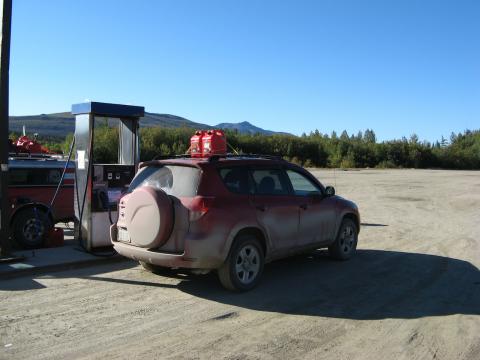
Here’s another photo from my drive from Fairbanks, Alaska to Deadhorse and Prudhoe Bay.

Today people on Twitter are noting the farthest north they’ve ever been. The farthest north I’ve ever been is Prudhoe Bay, Alaska. I drove there when I lived in Talkeetna.
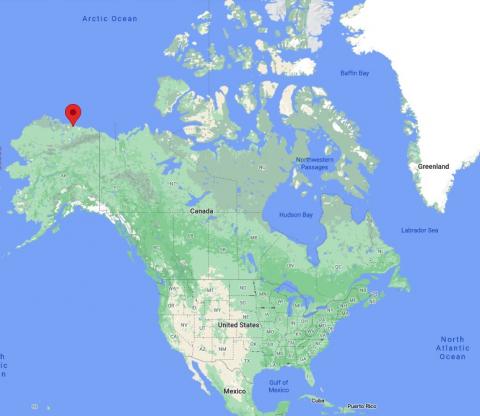
This is one of my favorite traffic signs in all of the world. You can find it if you drive north from Anchorage, Alaska towards Wasilla and Palmer.
When I lived in Alaska in 2010-2011, I would take the exit to the right to go to Palmer. If you keep going straight you’ll go to Wasilla, followed by Willow, Talkeetna, and eventually Denali and then Fairbanks. (If you’re really gung-ho, as I was, you can also keep driving to Prudhoe Bay, if you don’t mind 400 miles of dirt roads in the Arctic Circle.)
And as you can tell from the highway numbers 1 & 3, there aren’t many main roads in Alaska. :)

This is THE speed limit sign on the Dalton Highway in Alaska. If I remember right, this is the only speed limit sign you’ll see when headed north from Fairbanks heading towards Prudhoe Bay.
I started off driving about 50 mph, but then after realizing I was the only person on the road — an almost-entirely entirely dirt road — and how late it was going to be when I got to Prudhoe Bay, I drove as fast as conditions allowed.
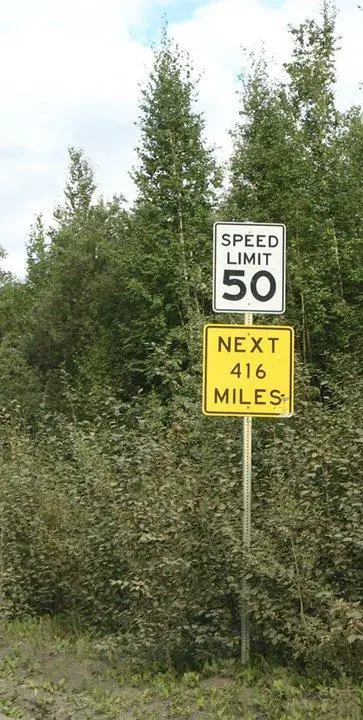
Scala performance FAQ: Is there a reliable way to determine the number of processors (CPUs) or cores when writing Scala code?
Solution
As I was reading this article on ZIO performance tuning, I decided to look into whether there is a reliable way to determine the number of CPUs or cores on a computer using Scala (and therefore Java, Kotlin, and other JVM languages).
The solution is that there seems to be a reliable way to determine the number of CPUs or cores in Scala. In short, use the Java Runtime class to get the information. This Scala example shows how to do it:
If you struggle with any form of addiction AND are also interested in mindfulness and meditation — to the point of being interested in enlightenment/awakening — this quote from Daniel Ingram may be a helpful motivator:
“Stagnation is guaranteed if you cling to pleasant sensations.”
In other words, you won’t make any progress on the enlightenment path until you get past the clinging to pleasant sensations — i.e., the pleasant sensations that you are addicted to.
Ram Dass offered a quote that’s in the same ballpark: “One way to get free of attachment is to cultivate the witness consciousness, to become a neutral observer of your own life.”
(A friend of mine dealt with addiction for as long as I knew her, and I know she was also looking for any motivation to quit, so I try to share anything I learn that might be helpful.)
In this ZIO performance tuning article by Pierre Ricadat, there’s this nice tip (shown in the image) about using ZIO.foreachDiscard instead of ZIO.foreach:
“One of ZIO's common operators is ZIO.foreach, which allows you to run an effect for each item in a collection. There's also ZIO.foreachDiscard that is faster if you don't need to collect results (e.g., if your effect returns Unit).”
For more details, see that article.

Here’s a quick Scala example that shows how to convert multiple spaces in a string to a single space:
scala> val before = " foo bar baz bonk "
before: String = " foo bar baz bonk "
scala> val after = before.trim.replaceAll(" +", " ")
after: String = foo bar baz bonk
As a “note to self” as much as anything, I just updated the following Scala videos and/or video pages:
- Video: Scala Intersection Types
- Video: Scala Opaque Types
- Video: Partial Functions
- Video: Partiallly-Applied Functions
- Video: Scala Extension Methods, Part 1
- Video: Scala Extension Methods, Part 2
- Video: Multiple Parameter Groups in Scala
I had a small issue with these pages, and I think that issue is now corrected.
The best way to keep a prisoner from escaping is to make sure he never knows he’s in prison.
~ Dostoyevsky
Leave your front door and back door open. Let your thoughts come and go. Just don’t serve them tea.
~ Shunryu Suzuki
| Tiny Changes, Remarkable Results | |

|
Atomic Habits |
